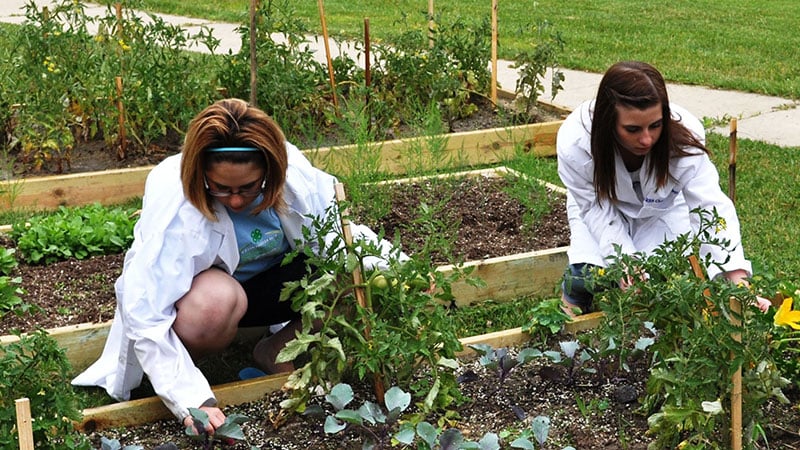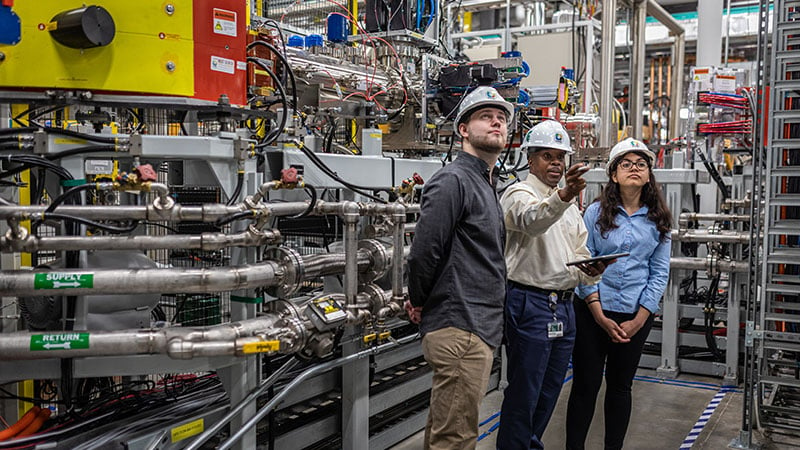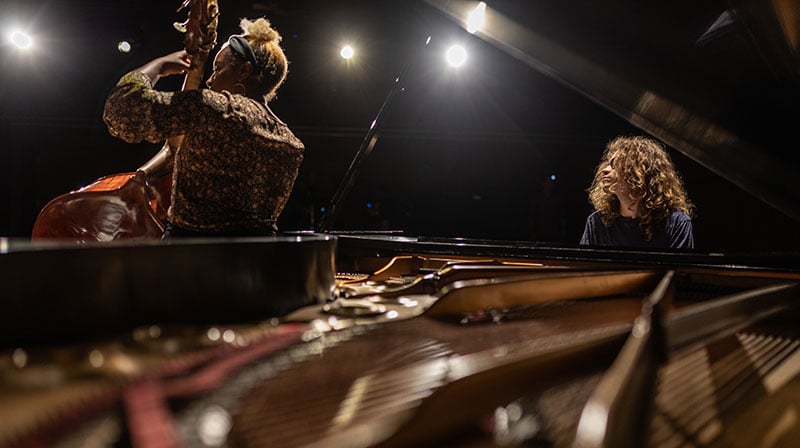At Michigan State, we pursue excellence in service to the common good, generating new knowledge and applying it in practical ways to address complex societal problems. We will expand our capacity for local and global impact, and by 2030 will reach $1 billion in annual research expenditures, an increase of about $275 million in annual expenditures.
MSU scientists, scholars and artists pursue excellence in service to the common good as they generate new knowledge and apply it in practical ways to address complex societal problems. They look for answers to fundamental questions that lay the groundwork for solutions to problems decades in the future. They also study our histories and cultures to assure new knowledge is informed by our collective and unique experiences as part of the larger society.
Research activities also focus on understanding the disparate impact of social problems on segments of our population, locally and globally. Researchers in the social sciences, humanities, health and law examine underlying reasons for these disparities and devise policy solutions to mitigate their effects on vulnerable members of society and promote well-being for all.
Michigan State’s world-renowned research spans from nuclear physics to plant biotechnology, K-20 education to digital humanities and beyond. MSU researchers are engaged in cutting-edge discovery and creative work across all seven continents and support world-class research programs.
The Facility for Rare Isotope Beams (FRIB), funded by the U.S. Department of Energy Office of Science, MSU and the state of Michigan, will play a vital role in developing the next generation of scientific leaders and innovators. When it opens in 2022, FRIB will be the preeminent user facility of its type in the world, providing opportunities for the advancement of nuclear science and accelerator science and engineering, leveraging our expertise in cryogenics, and allowing collection of isotopes for applications ranging from testing materials for spaceflight to development of new biomedical imaging diagnostics and therapeutics. With our No. 1-ranked graduate program in nuclear physics and superb facilities, MSU attracts stellar students from around the globe, and 26% of U.S. nuclear physics graduate students receive part of their training at MSU.
MSU scientists have been a vital force in improving agricultural practices and food crop yields across Michigan and around the globe for decades. Our plant, soil and environmental science scholars are internationally recognized as among the best in the world, and our deep connections from bench to field and partnership networks across the state and around the globe drive rapid translation from discoveries in fundamental plant biochemistry, genetics and genomics to innovation in agricultural systems, crop production and sustainable practices in the environment. With its 14 research centers and facilities spread throughout the state, MSU AgBioResearch provides a critical real-world living laboratory to interdisciplinary research teams as well as commodity groups, growers MSU Extension and other partners.
For more than 70 years, our expertise has been used to improve food security in sub-Saharan Africa and today research and outreach extends to more than 120 countries worldwide. Our supply chain experts have streamlined logistics for moving food from growers to consumers and our storied packaging program is helping reduce waste and improve safety. In Michigan, MSU Extension has helped grow Michigan’s economy for more than 100 years, equipping Michigan residents with the information to do their jobs better, raise healthy and safe families, build their communities and empower children.
For decades, MSU has stood at the forefront of educational research and preparation of teachers and educational leaders and changemakers. Preparing citizens in the United States and globally to address the dynamic and daunting issues facing humankind requires an ongoing commitment to educational research, leadership and practice. MSU has made extensive contributions in literacy, early childhood education, civic education and STEM education at the K-12 and college levels.
We have growing strength in biomedical research. Our investments include the Institute for Quantitative Health Sciences and Engineering (IQ), which houses more than 20 laboratories and state-of-the art biomedical imaging equipment, the Grand Rapids Research Center, and the Research Alliance with Spectrum Health. Leading-edge research facilities built in East Lansing and Grand Rapids in the past five years with contributions from the state of Michigan and private support, respectively, have played an essential role in attracting world-class talent.
Additionally, MSU is leveraging new and expanding partnerships with health care systems including McLaren Hospital and Henry Ford Health System to advance research in cancer, neurology, precision health and health disparities as well improve efficiency and cost-effectiveness of health care delivery. In Flint, addressing health disparities is one of our key foci. Our innovative public health initiative there was built in partnership with the Flint community as we seek to sustainably translate clinical research to practice and to improve the health of communities.
Over the next several decades, the interface between changes in land use, the condition and performance of physical infrastructure, and climate change will become an environmental grand challenge causing risk to water quality, food production, health and economic vitality. MSU’s multidisciplinary research engaging engineering, business, hydrology, ecology and microbiology has led to outstanding work in water quality including wastewater-based epidemiology, environmental virology and recycling of hazardous waste materials. New molecular tools and instrumentation will enable new discoveries through environmental surveillance of the built and natural environments.
The evolving nature of work is changing all aspects of life, both in the workplace and beyond. Rapid technological advances are transforming jobs and industries, driving the need to understand how new artificial intelligence and automation are reshaping the education, skills, training and retraining workers require. Researchers in the Colleges of Business, Communication Arts and Sciences, Engineering, Natural Science and Social Science are partnering with the corporate sector to assess how these changes often referred to as the fourth industrial revolution will change educational systems and labor markets and to advance research to help society adapt to this sea change in work.
MSU initiatives in communications and data science are responding to changes in the way information reaches the public, how people communicate with one another and how to work effectively and ethically in a world of big data. From addressing the challenges of misinformation and disinformation to development of tools designed to enhance cybersecurity, MSU is contributing solutions with applications in fields ranging from health to business.
MSU’s Arts Strategy seeks to integrate the arts into our research and creative endeavors. By designing deliberate opportunities to bring the arts into active engagement with research across disciplines, we recognize the potential of co-discovering and co-creating that can drive innovation, open new ways of knowing, lead to the identification of new issues and concerns, and amplify the broader impacts of knowledge generated at MSU.
Michigan State has enormous strengths and distinctive culture flowing from its roots as the nation’s premier land-grant university. We will build upon those that serve people and communities today and draw on our reservoir of will to bend the curve for humanity tomorrow. Our planning will bring together disciplines in new ways and recognize critical planning intersections including how new facilities, judicious land management and state-of-the art equipment enable research excellence.
Goal: Be a leader in developing transdisciplinary solutions to ecological and human problems affected by social, economic, political, climate and environmental changes
Objective 1
Demonstrate excellence in science, scholarship and creative endeavors, both in pursuit of fundamental knowledge and research designed to improve the human condition and address problems of today and to prepare for the challenges of tomorrow
Strategies/Actions
- Be the global leader and center for nuclear physics and ensure FRIB brings benefits to Michigan; invest in FRIB to drive discovery science, maintain educational excellence and expand education and training pathways, pursue differentiating initiatives that yield practical benefits (i.e., multidisciplinary biomedical imaging and therapeutics based on harvested isotopes) and attract private partners
- Lead local and global efforts to enhance food production, distribution, food safety and food security in a changing global climate using our strengths in plant and soil sciences, environmental sciences, animal health and production, agriculture and natural resource interactions, nutrition, big data and machine learning, and geospatial imaging along with our worldwide network of partners
- Building on the strength of MSU Extension and epitomized by our work in Flint, support research initiatives to create applied, problem-based solutions in real-world contexts at the regional, national and international levels, in urban and rural environments, working in partnership with communities
- Support planning/collaboration around submission of large, transdisciplinary grants, including seed funding, to yield select transformative research initiatives over the next five years in priority areas (could include initiatives to promote equity in health, the environment, education and social, criminal, economic and climate justice)
- Support research excellence through a coordinated planning approach that aligns University Comprehensive Facilities and Land Use Plan, requests for state capital outlay support, philanthropic priorities/donor outreach and faculty recruitment
- Strengthen campuswide, interdisciplinary/transdisciplinary solutions to climate/environmental change
- Continue faculty hiring initiatives such as the Global Impact Initiative; use these resources to strengthen areas of excellence, build capacity to meet society’s challenges and diversify our faculty
- Bring MSU Arts Strategy to life, designing deliberate and substantive opportunities to bring the arts into active engagement with research across disciplines
- Nominate faculty to serve in leadership/advisory roles in key federal and state agencies
Objective 2
Invest in research to advance partnerships that increase economic development and opportunity in our region and beyond and that helps understand, shape and improve the future of work and the workforce
Strategies/Actions
- Engage in systems-level and multidisciplinary research to assess the societal implications of change brought about by the fourth industrial revolution, particularly in the labor market and fundamental nature of work
- Build upon Michigan’s history as the auto capital of the world, our proximity to leading industry partners and cross-campus expertise in engineering, business and social sciences to play a leading role in developing human-centric, multi-modal mobility solutions for the 21st century
- Forge new partnerships with industry, health care, and local and national businesses to commercialize MSU inventions, enhance economic development and create internship and career opportunities for students through a robust ecosystem of startups, research institutes and commercial enterprises powered by an MSU Innovation Network spanning Grand Rapids, East Lansing, Detroit and beyond
Objective 3
Develop and implement new strategies to recruit and retain highly talented and more diverse student and faculty researchers and scholars across all disciplines
Strategies/Actions
- Expand partnerships with HBCUs, HSIs, Tribal Colleges and Minority-Serving Institutions to recruit underrepresented faculty and students
- Incentivize development of new graduate student-focused training programs
- Increase availability of research programs for high school and undergraduate students to enable every student who wants a research experience to have one while developing pathways to careers in research
- Systematically pursue honorifics, awards and recognition for faculty, students and postdoctoral research associates
- Achieve new recognition with highly prestigious external awards for at least 10 MSU faculty members by 2030 (i.e., National Academy of Sciences, National Academy of Engineering and National Academy of Medicine members, Guggenheim Fellows)
Discovery, Creativity and Innovation for Excellence and Global Impact: Illustrative Indicators/Metrics
- Total annual research expenditures to reach $1 billion by 2030
- Total number of faculty in national academies and other distinguished academic societies (increase)
- QS World University Rankings — U.S. universities, agriculture and forestry ranking (increase to top 5 globally)
- Faculty in leadership/advisory roles in key federal and state agencies (increase)
- Multidisciplinary research projects/initiatives/activity in global grand challenges priority areas (increase)
- Number of undergraduate students involved in research programs in multiple disciplines (increase)
- Training grant programs for graduate students (increase)
MSU Extension
MSU Extension has been a differentiating force for more than 100 years — a deeply integrated network helping to translate world-class research and apply life-changing knowledge, in real time, across Michigan.
Facility for Rare Isotope Beams
The Facility for Rare Isotope Beams (FRIB), opening in 2022 and funded by the U.S. Department of Energy Office of Science, MSU and the state of Michigan, will be the preeminent user facility of its type in the world —driving discovery and developing the next generation of scientific leaders.
Arts
As we shape the engaged university of the 21st century, MSU has developed a coordinated Arts Strategy that recognizes the arts as vital paths to knowledge and embeds them in the university’s academic mission.


